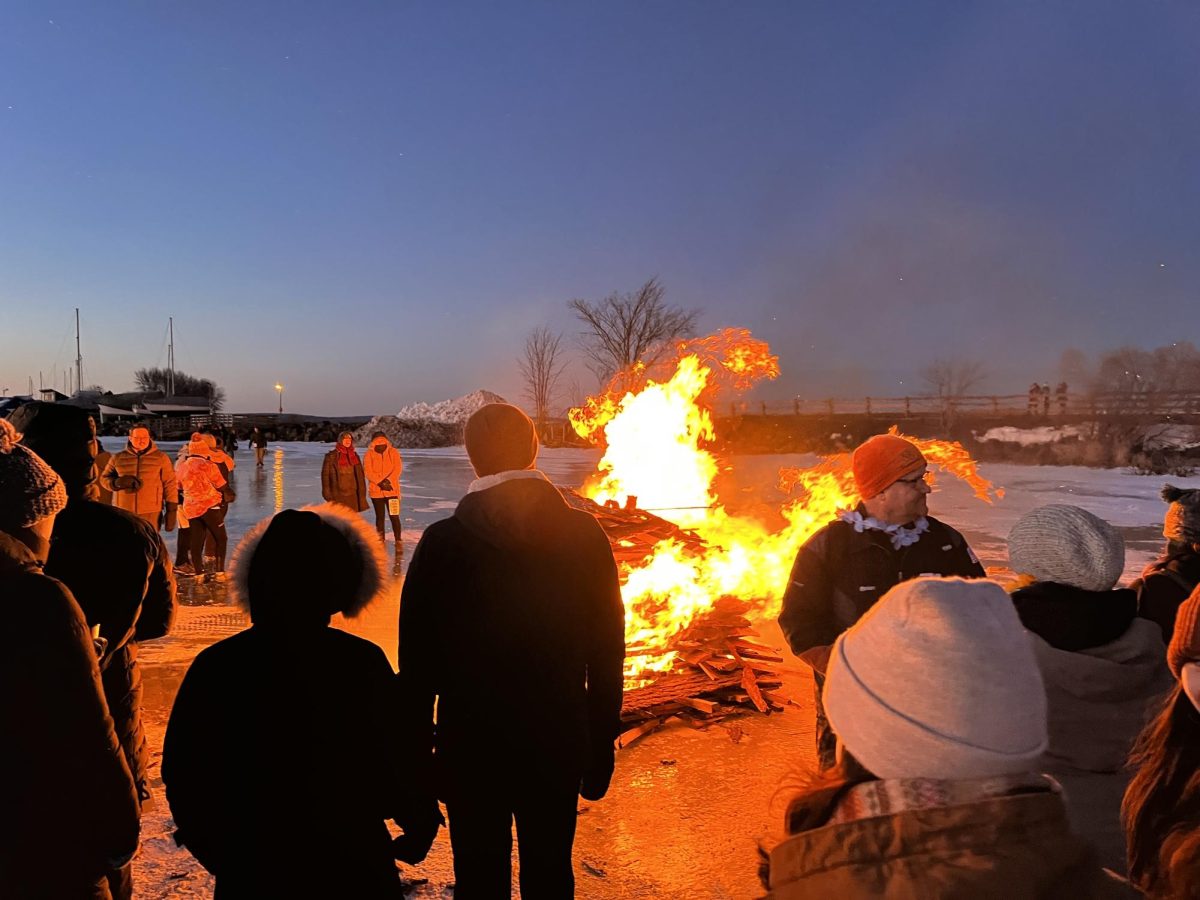Last weekend, from Feb. 17–18, around seventy Carleton students participated in “Book Across the Bay” through a trip hosted by the Carleton Association of Nature and Outdoor Enthusiasts (CANOE). Throughout Saturday evening, they followed a trail lit by luminaries (candles stuck into ice) to cross six kilometers of Lake Superior’s frozen surface.
“We leave Saturday morning, usually around 11-ish, and it’s about a four-and-a-half hour drive to Ashland, which is right on Lake Superior,” said Kaia Neal ’25, CANOE’s Student Activities Office liaison. “And then we hang out for a bit. There’s a tent, food and vendors.”
Those participating in Book Across the Bay proceeded to the race’s starting line, which was on the ice in front of the Hotel Chequamegon this year.
“[The race] starts at six,” said Neal. “Usually there are different waves like skiing, skate-skiing and classic skiing, and there’s walking and running.”
In most years, the event includes four total waves of participants. The first wave is composed of competitive skiers and snowshoers, and the second and third waves are made up of those skiing and snowshoeing recreationally. These first three waves are timed while the last wave is untimed and includes all walkers and runners (without snowshoes) as well any skiers and snowshoes who wish to participate without being timed.
“This year, we were all just walking, so we were lumped together. Usually it’s a 10K, and they have a little bonfire and tent at each kilometer, which is super fun,” said Neal. “But this year, it was shortened down to a 6K.”
After winding their way through points such as Solstice Outdoors and the Maslowski Beach, participants finished the race at the Winter Fest Event Tent, which was located in the Marina parking lot.
“After the race, there’s this big band at the finish line and there’s dancing and cider,” said Neal. “There’s usually chili; this year, there was not, which was the one sad part. We dance for a bit, and then we head over to Bayfield, which is about half an hour away, and we stay in this really big pavilion. It’s right on the lake, and it’s supposed to be an event space, I think, but we just go and lay our sleeping bags out on the floor. We wake up in the morning and drive back, and we get back at around one on Sunday.”
In addition to a shortened route, this year’s trail was entirely untimed and walking only. Participants walked closer to the lake’s shore and on part of the Ashland Lake Shore Walking Trail due to this year’s higher temperatures and the lake’s subsequently-thinner ice.
“It was definitely shorter, and there was also no skiing, but I think that [the organizers] did a great job. They kept the energy up and had these different prizes that they’ve never had before,” said Neal “They had a prize for the first person who crossed the finish line holding a ski, the first person who crossed holding a snowshoe and the first person who crossed barefoot. I think that people just took their shoes off as they were crossing and then put them back on. So that was a little different.”
These prizes were the Ski Race Award, winner of the snowshoe category and the Coldest Feet Award, and they were established by the event’s organizers to add festivity to this year’s changed course.
“It’s through the city of Ashland — they run it — and it has a lot of big sponsors,” said Neal. “Northland College sponsors them, and I think that it’s a big collaboration between many organizations, but I know that the city does a lot of work.”
In addition to a changed event, CANOE also ran its registration process differently and had to adapt to the campus’ needs in the weeks leading up to the event.
“Campus was so sick this year, and [CANOE] was also covering people’s registration costs,” said Neal. “We got a big chunk of money from the [Carleton Student Association] in our budget to cover people’s registration. We’re working on that system because this year, we wanted to send in final numbers, so we paid for everyone who ended up going. So the registration system was a little complicated because [paying for people’s registration] was new this year.”
“[The cost] is about forty dollars, so it’s pretty substantial,” Neal continued. “It was nice to be able to cover for people, and we’re going to do that again next year. We only ended up having seventy-ish people go because so many people dropped. It was up in the air for what [Book Across the Bay] would be like this year, but it ended up working out great.”
Jocelyn Akst ’27, who attended the event, said, “It was really great to get off campus, see Lake Superior, and spend time outside with my friends.”
Coordinated for Carleton students by CANOE, this trip runs every Winter Term and is open to one hundred students.
“I know that this has been going on for years,” said Neal. “When I was looking into applying for Carleton, I went on the website and saw pictures [from Book Across the Bay]. It’s actually one of the things that convinced me to come here because I knew that I wanted a strong outdoors club, and it just looked so fun.”
Having attended Book Across the Bay every winter, this year was Neal’s third time participating: “My first year going, I had just made this friend through the Nordic Ski club, and now we’re best friends. But our first year, we were still new friends. But we went together and walked the whole thing together. It was moonlit, and there were stars, and we got super deep. It was a great way to connect…They always have this band at the end…I love the whole thing, but the end with the dancing and the live music — it’s just great vibes.”
Neal’s first Book Across the Bay trip inspired her to run for CANOE Board, leading to her helping to run the trip last year and this year.
“I think winter gets a bad reputation. Many people picture winter and think it means hunkering down indoors and pushing through, but winter is full of so many opportunities to get outside. There’s skiing, snowshoeing, ice skating, snowball fights… all of these are not possible during the rest of the year. Book Across the Bay is such a magical event that really highlights the beauty of the colder season. Hopefully this trip inspires more people to get outside and really appreciate everything that winter gives us.”
“I assume that — well, fingers crossed that winter will be more normal next year, and we’ll actually have snow and colder temperatures,” continued Neal. “It should go back to how it was before, where it’s a 10K, there’s a lot more bonfires, and hopefully more people that we can bring.”












ann suter • Mar 21, 2024 at 8:53 pm
This sounds so wonderful…Go for it!
Ann Suter